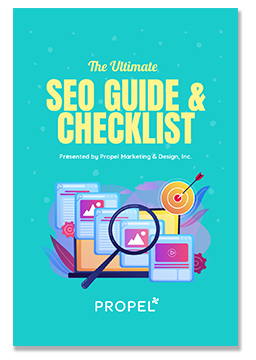Google is well known for its consistency with inconsistency. Meaning, it likes to make algorithm changes and it likes to make them often. Sometimes, those changes may work to your benefit, and sometimes they may not.
We’re sure you’re aware of the latest and greatest Google algorithm change called May 2020 Core Update, and since this finished rolling out, you may have noticed a decline in your rankings. Today we’re going to discuss how you can not only survive, but also thrive after a Google algorithm update.
We’ll talk about:
- Why Google performs these algorithm changes
- Google’s May 2020 Core Update
- What Google has to say about its updates in general
- Tips for your successful Google update transition (how to survive and thrive after a Google algorithm update)
- And, Google’s recent announcement about their 2021 page experience algorithm update (don’t panic, 2021 is still months away)
Without further ado…
Why Google Performs Algorithm Changes
What is life, if not change? Change happens all around and constantly, Google is no different, making thousands of updates to its algorithm every year.
But, why?
First, don’t take it personally, Google is never out to get you or come after your business, that said, you and your business, aren’t its priority. Your customers and users are Google’s priorities.
Google wants to make absolutely certain that users are receiving the best search results out there when a user types in a query.
Google is constantly watching and learning from how users search and how they react to the results, in doing so, Google makes updates on its end to support the users’ experiences.
Improving its algorithm regularly ensures the user finds what they’re looking for with the greatest ease.
You may feel that Google doesn’t do this well when one day you’re at the top of the SERPs (search engine result pages) and after an algorithm update you can’t even find yourself on the SERPs. It’s frustrating, we know.
But, Google does know what it’s doing since it basically just collects data for a living.
So, although it’s terribly annoying and can cause some issues for you personally, your best plan of attack is to figure out how you can work the algorithm change to your advantage as quickly and easily as possible.
Because let’s face it, these updates aren’t going anywhere.
Google May 2020 Core Update Details
We all know that Google is pretty vague when it comes to its search engine ranking algorithm updates.
They always let us know that an update is coming, which is great, but often the fine details are more difficult to figure out. And, the latest update was a doozy.
Here’s what we know:
- The rollout is complete and you should use your data to figure out where you need to improve ASAP
- Google is fully aware that these core updates have winners and losers, but its guidelines are unwavering so learn them and put them into full effect
- You should constantly be upping your content strategy game, through authoritative and quality link building, excellent and unique copy using keywords that fit you best, images and videos with SEO (search engine optimization) supporting them, etc.
- User experience (UX) is key to a successful website
- Use tools that provide insight into your ranking, keywords, and website
Here’s What Google Says About Search Algorithm Updates
Google stands behind its educated and data-driven decision to make changes to its search algorithms.
These updates are “designed to ensure that overall, we’re delivering on our mission to present relevant and authoritative content to searchers… We confirm broad core updates because they typically produce some widely notable effects. Some sites may note drops or gains during them. We know those with sites that experience drops will be looking for a fix, and we want to ensure they don’t try to fix the wrong things.”
Google is never trying to inflict damage on a site’s page or target businesses that are in breach of Google’s guidelines or ethical standards during these core updates (this is done through other means), but rather is working to improve how it views, reads, and assesses content overall.
Taking Google’s excellent example, think of it like this:
“One way to think of how a core update operates is to imagine you made a list of the top 100 movies in 2015.
A few years later in 2019, you refresh the list.
It’s going to naturally change.
Some new and wonderful movies that never existed before will now be candidates for inclusion.
You might also reassess some films and realize they deserved a higher place on the list than they had before.
The list will change, and films previously higher on the list that move down aren’t bad.
There are simply more deserving films that are coming before them.”
This is the thinking behind search algorithm updates, with consistent new data, new economies, new discoveries, new needs- things are bound to change and need to update.
One thing holds fast and true, though, and you know it: quality content. Every algorithm wants to see and reward great content, so if you lose some rank after an update, getting better content out there is a great and proven way to start making your way back up.
Google has a lot to say about how you should be updating your content, even if you think it’s already pretty stellar. We recommend hearing it from the horse’s mouth.
In a nutshell:
- Ask yourself some good questions so you can improve your content (question examples found in link above)
- Ask friends or others who are uninvolved with your brand and business for their honest feedback
- Do an audit of your losses
- Check your E-A-T: expertise, authoritativeness, trustworthiness
- Fix your thin content (pages with low-word counts)
- Update your content frequently
- Fix your SEO errors
Also, remember, Google isn’t perfect and isn’t claiming to be. If one of their search algorithm updates wreaks havoc on a great website or page, don’t fret, their next update will most likely fix the issue and give your page the love it deserves. Google isn’t human, it’s not reading the page the way humans do, so there is a margin for error. However, those errors are generally taken into account quickly so that you can recover quickly.
And, hey, guess what? Even some of the most popular brands, businesses, and websites see a decline after an update. You’re not alone, it happens to the best of us.
Tips for Surviving and Thriving After a Google Update
Want to get your website and rankings back to where they used to be? Of course, you do. First off, read how Google wants you to handle it. That’s a no-brainer because since this is done through an algorithm (not manual), Google needs to tell you exactly what to do to improve your ranking through their precise terms. That said, Google never really tells you “exactly” what to do, so read what they have to say and use the items that make sense for you.
Here is a list of tips (some repeated from above but with a bit more detail):
Follow the right sources – the keywords in this are “right sources”, you’re gonna find a slew of advice and details on the WWW after an update, so make sure you get this advice and detail from a reputable, reliable source. Reading the Google Webmaster Central Blog is a safe place to start your research.
Watch your traffic and positions – this is the best and fastest way to figure out if you’ve been penalized, a rank tracker will help you with this, if you don’t already have a tool for it.
Conduct an SEO / content marketing audit quarterly – you should be doing this constantly, core update or no. What you may not know, is that Google updates their algorithms on the regular, some are really minute and don’t get much, if any, attention, but these updates can STILL affect your ranking, so stay on top of your data so you know how to best handle all the updates and your competition.
E-A-T: expertise, authoritativeness, trustworthiness – if you want to be a well-established, recognizable, and formidable source in your industry, you’re gonna need to E-A-T through all things SEO.
Fix your thin content – pages with low word count aren’t helping you, so fix that with some unique and high-quality content that utilizes your keywords, keep in mind that content isn’t always copy, so add in some optimized images and videos whenever you can.
Update your content frequently – if you want to stay at the forefront of your industry and get the masses to come back for more, you’re going to need to update your content well and update it often.
Fix your SEO errors – not a lot to say here, definitely a no-brainer, but if you’re not regularly performing audits, you won’t know what’s working and what’s not and if you don’t check your data, you won’t know if SEO errors are hurting your rank, so be sure to understand how you’re performing at all times.
Get in touch with an expert – if you don’t have the time or resources to figure out how to get back on track after an algorithm update, it’s imperative that you reach out to a company that knows the ins and outs of these changes, such as Propel Marketing & Design, no one wants to lose their ranking momentum, and a good digital marketing company won’t let you.
Also, use tools, people! So many are free and they will help you sort out your pages much quicker than you can figure it out on your own.
Planning for the future…
Google’s Upcoming Page Experience Algorithm Update
(Say that 10 times fast. I dare you)
Okay, this is unprecedented (like pretty much everything thus far in 2020), but Google has given us a heads up that they will be updating their page experience algorithm in 2021.
This means you’ve got some time to make the appropriate adjustments so you don’t lose any traffic. We’ll take that for a win.
What is page experience?
Basically, this algorithm can dissect how your users work and react to your webpage. It goes hand-in-hand with the user experience (UX). If the page is difficult to navigate or has underlying technical issues, even if you’re currently number one on Google, your rank will pay the price after this update is done rolling out.
So, ask yourself this, is my website friendly and usable? If it is, good for you (keep in mind, this is an ongoing task). If it’s not, you’ve got some optimizing to do.
And since Google was kind enough to let us know this is coming, we know what needs to be done to make your website shine before, during, and after the page experience update.
First off, it’s important to note that these updates and optimizations need to be done on every single page of your website for it to be a successful process.
Here are five smart steps to start taking right now:
- Check your page-load speeds for free- find out if your load time is holding you back, no one wants to wait for a page to load (and they won’t, no matter how great your brand is or how awesome your deal is), shoot for a one-second load time on both mobile and desktop (it must be under three-seconds, though)
- Get rid of your 400 errors- broken pages are super annoying for users and they aren’t going to continue trying to find you if your page isn’t working, they’ll simply move on to your competition
- Check out how your competition is doing with their page experience- we’ve said it before, we’ll say it again, knowing how and what is going on with your competition is super smart and provides invaluable insights to you
- Get real data about each pages’ design– once you know how the design of your page is affecting your users, you can update and redesign as necessary for a better overall experience
- Add the Ubersuggest Chrome extension– this handy number will give you some data on the sites that pop up after you type in your query, pay attention to the ‘domain score’ and the ‘links’, if a business isn’t doing well in one or both of these, but still ranking high on Google, it means they’re doing a lot of other things correctly, so check out their pages and review closely
User experience and page experience are already important to your ranking and it looks like they will only get more important as time goes on. So, yes, make sure you’re optimized for Google’s 2021 page experience algorithm update, but also, just make sure you’re optimized for the benefit of your users.
The Takeaway
Google is here for the people, they aren’t trying to hurt your business, but they are trying to maximize the users’ experience, so don’t take it personally when these search algorithm updates push you back.
Jump in and take care of your business through ethical, smart, and tried and true Google-recommended tips so that you get where you want to be on the SERPs and your audience can find you, use you, and buy from you with ease.







![How to Write a Professional Chiropractic Bio [Template Included]](https://propelyourcompany.com/wp-content/uploads/write-a-bio-500x383.jpg)

